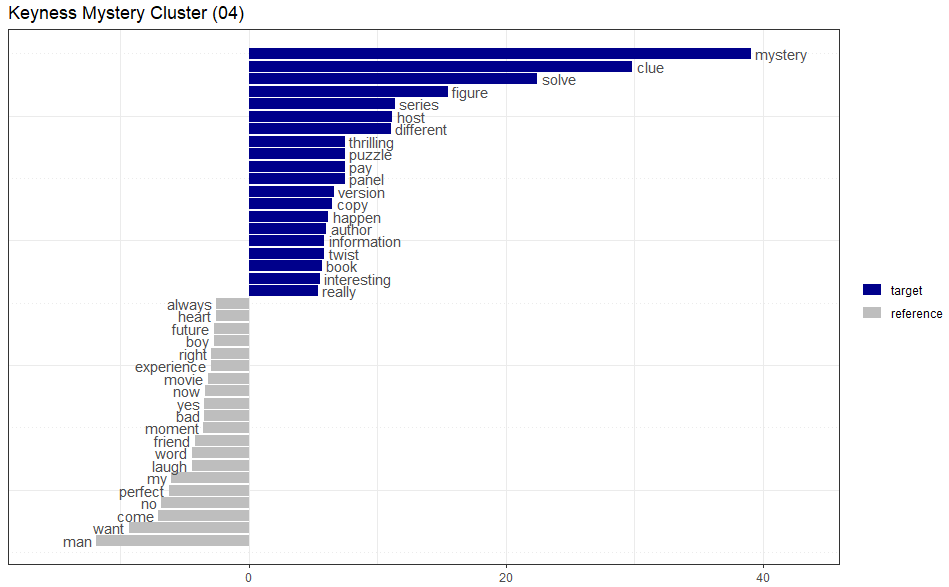
The Mystery Cluster (04) is the biggest cluster containing 23 reviews, roughly half of them belonging to the Mystery genre (12), which equals 46 percent of the total number of Mystery reviews in the network. Furthermore, it consists of 22 % Horror/ Thriller (5) and Science Fiction (5) reviews respectively, which represent 18 and 21 percent of all reviews of those genres in the network, as well as one Romance review. It has connections to the Science Fiction (01), Horror/Thriller (07) and the Horror/SciFi clusters (08). Within the cluster itself, reviews on Mystery novels build the core of this cluster. This is shown by them being more strongly interconnected than the ones at the outer rim of the cluster, which belong to other genres.
The most dominant absorption dimension in the cluster is Attention, followed by Impact and Emotional Engagement, which corresponds to the overall distribution of Absorption in this genre. In the fine-grained annotation we see peaks in General Sense of Absorption, Inability to stop Reading and Anticipation Book Series. The latter is reflected in the keyword “series”, while attention itself is a theme in the reviews as reflected in the terms “happen” and “pay”: “I can’t wait to see what happens next.” (NakedSun13537497); “My biggest piece of advice to anyone reading is: PAY ATTENTION.” (7DeathsOfEvely12934387) The former is frequently used in statements annotated as Anticipation or Anticipation Book Series, whereas the latter is not covered by the annotation framework.

Regarding the keywords in general, it is significantly more difficult to distribute them into the categories that have previously been used. There are only two words that uniquely describe the content of two of the books in the cluster, namely “panel” and “host”. The reason for this might be that stories in this cluster, unlike those discussed before, do not take place in alternate worlds or the future. This makes the vocabulary used for plot description less distinct. Arguably, “mystery” and “solve” are also descriptions of the content: “It was interesting to see Holmes in an entirely different environment still being himself when it comes to solving mysteries.” (LockedRooms13119513). The word “mystery” encompasses its role as a genre descriptor as well as the fundamental concept of most novels within this genre. This polyvalence could potentially contribute to the cohesive clustering observed in this genre.
| Category | Keyword |
|---|---|
| Genre | mystery |
| Experience | thrilling, interesting, solve(1), figure, pay, happen, author |
| General descriptors | book, different, twist, clue, puzzle, information, really |
| Content | panel, host, solve, mystery, happen |
| Additional information | series, version, copy, happen, author |
| Other | none |
Moreover, readers in this cluster share a lot of the same experience, as seen in the absorption-annotation, and thus tend to use similar language to express themselves. For example, eight out of 14 absorption statements annotated as Inability to Stop Reading used some form of not being able to “put down” the book, while two reviews that used the very same phrasing in Anticipation Book Series: “I cannot wait for the next book.” (LockedRooms13119513 & MazeOfBones13100053). Furthermore, the reading experience of Mystery reviewers in this cluster significantly differs from that of readers of other clusters. One can observe evidence for active cognitive involvement, as expressed by the keywords “clue”, “figure [out]”, “puzzle” or “information”: “Mind you, each scene, character, and information is important to the story; without each and every one of those, there would be a missing piece to the puzzle of this book” (7DeathsOfEvely12934155). This expresses that readers do not only enjoy the unraveling of the mystery by the characters, but consider their own efforts or success of solving the puzzle as equally important: “their [sic] are clues on every page of the book that will help you know what will happen next just like the character in the book” (MazeOfBones13099887); “If I could find something to dislike in this book, I’d say I was confused at certain times by the clues given. I find myself trying to figure out who did it, and never fully put the whole thing together. I never would have figured out the mystery on its own” (7DeathsOfEvely12934387). This leads to the point where they engage with the book even beyond the act of reading itself: “you have to do your research or know a lot of info to figure them out. […] The fact that you can register online and get your own clues in the books is an added bonus as well. It has been fun figuring out our own clues and feeling like more of a part of the story.” (MazeOfBones13100056)
This emphasis on active involvement in the process of understanding becomes particularly apparent when considering the reviews of other genres in this cluster. The overarching tenor of these reviews seems to be that the reviewed texts are, in different ways, rather intricate and that there is a focus on navigating these complexities. But unlike the Mystery reviews, the active cognitive involvement is not understood as a matter of course, but as an obstacle that has to be overcome: “I was neutral on Emily for about half the book, trying to figure her out, and then bam! I got it. I really liked her and felt for her.” (Collide798928); “It took me three years and three attempts to get into this book, but am I glad i [sic] finally did. For me the key was to figuring out of what i [sic] thought the starting anchore [sic] point and the timeframes of various chapters…I know its [sic] hard” (UseOfWeapons13576219).